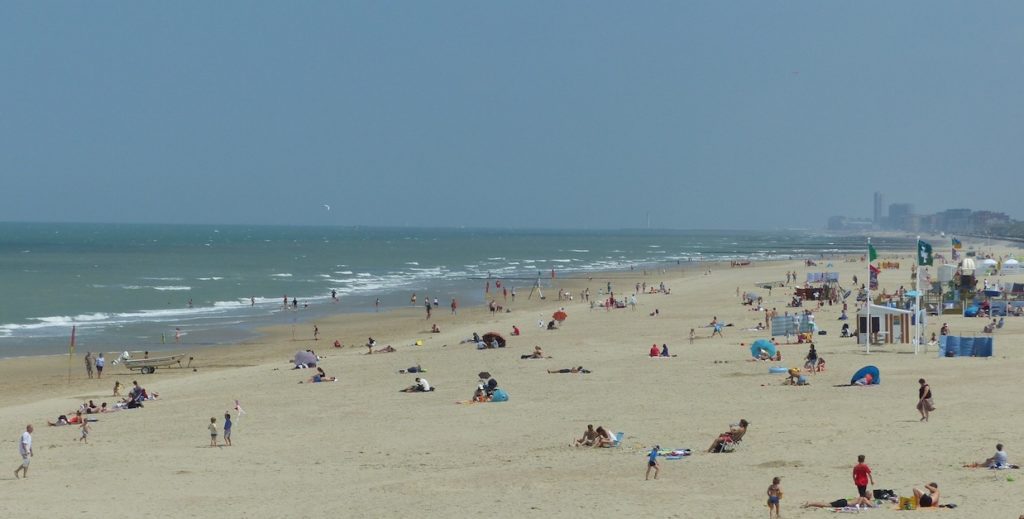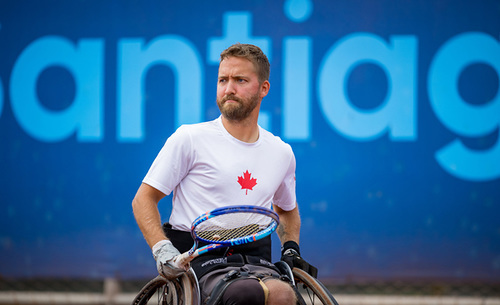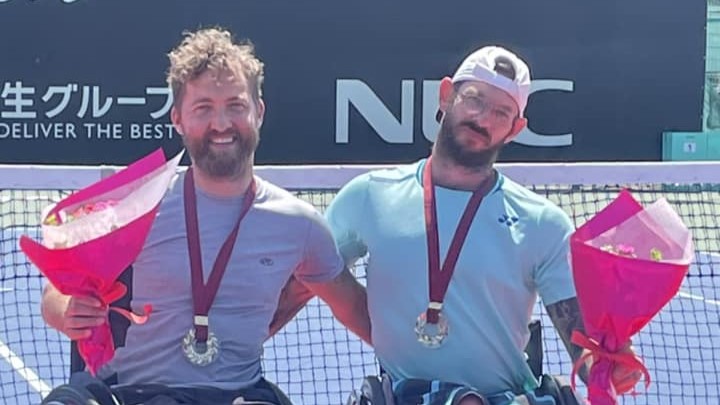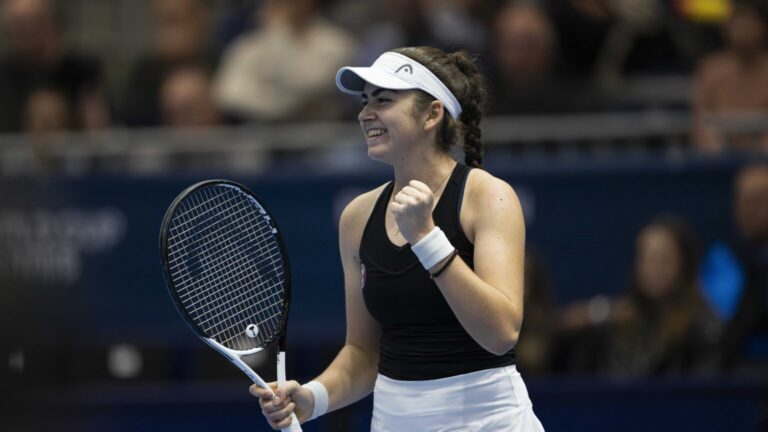
After a week marked by drizzly rain and dreary skies, a summery clime returned on Thursday and the beach at Middelkerke was well-populated with sun seekers.
It’s supposed to be more of the same when the opening singles of the Davis Cup World Group quarter-final between Canada and Belgium begins Friday at 1 p.m. (7 a.m. EDT in Canada) in Middelkerke, situated 20 minutes south of the major seaside city of Ostend.
When the official draw was done on Thursday at the Middelkerke Casino right on the water, it was largely good news for Canada.

The name Steve Darcis came first out of a tennis ball and that meant the No. 76-ranked Belgian will play Canadian veteran Frank Dancevic in Friday’s opening match.
Both Canadian captain Martin Laurendeau and Belgian captain Johan Van Herck downplayed the importance of who plays that first match. But with world No. 14 and No. 1 Belgian David Goffin facing rookie Filip Peliwo, currently ranked No. 491, in the other opening-day singles, it makes sense that Dancevic has a better chance of gaining a victory and would prefer to be first up.
“It’s kind of nice to have our veteran (Dancevic) go out there first,” conceded Laurendeau. “But at the end of the day it’s one match at a time. There are no big issues with whoever plays first.
“We’re preparing for a long weekend with adverse conditions. We’ve learned to not get ahead of ourselves in any situation.”

Dancevic, 30, recalls coming up through the junior ranks with Darcis, 31, well over a decade ago. They have played twice before, with the Belgian winning both – at Wimbledon in 2009 and in the Sydney qualifying in 2008.
“He’s a very talented player and has had a good year,” Dancevic said about Darcis. “We have similar game-styles and I’m looking forward to the match.”
Darcis comes into the opener on a six-match losing streak dating back to March. But he has been bothered by a wrist issue that appears to have been helped by an injection before Wimbledon.
“Dancevic is a very dangerous player,” Darcis said about his contemporary. “His ranking has gone down but he’s got a lot of talent and he knows what to do. I’m going to have to play hard from start to finish.”

In his Davis Cup debut, Peliwo has drawn a tough opponent in 24-year-old Goffin. The Belgian came back from an injury last summer and won the ATP 250 event in Kitzbuhel, Austria, and four Challenger events in a row from July to October – going a combined 44-4 through the end of 2014.
He has continued his winning ways – 20-15 – this year and his current No. 14 is the highest ever ranking by a Belgian man.
Peliwo has struggled for much of this year, bothered until recently by a psoas muscle problem in his hip/upper leg area. Known for his tenacity and intensity, he will have to call on all of that and more against Goffin, a smooth-stroking, fluid-moving player who first came to prominence when he played a wildly entertaining round-of-16 match at the 2012 French Open against Roger Federer on Court Suzanne Lenglen before losing 5-7, 7-5, 6-2, 6-4.
“I’m not intimidated but obviously he’s a great player and I respect his ability and his skills,” Peliwo said about Goffin. “It won’t be an easy match but I’m there to fight. That’s what I’ve got to do.”

Asked by a Belgian reporter if he had ever played a best-of-five sets match, Peliwo replied, “never a full five sets – in practice yes, but never in a match.”
Goffin, who has watched Peliwo in practice, said about the 2012 ITF World Junior Champion, “I’ve seen him play a little bit. He’s a good striker of the ball. He’ll be very motivated. I’ve got to hit hard and try to make him miss. He’s got nothing to lose and I’m the favourite. I’ll just prepare as I usually do and try to play a good match.”
The doubles line-ups, which could changed, are Daniel Nestor and 33-year-old Davis Cup rookie Adil Shamasdin against Ruben Bemelmans and 21-year-old Belgian rookie Kimmer Coppejans. In 2012, Coppejans won the French Open Junior title beating Peliwo in the final, but finished second behind him in the ITF year-end rankings. He currently has his ATP ranking up to 102.
There’s unlikely to be a change on the Canadian side in doubles, but the Belgians might substitute for Coppejans. “If need be, I can play three matches,” Goffin said. “I’m feeling super good.” Darcis is also a possibility to play with Bemelmans.
It was interesting to listen to Belgian captain Van Herck talk about his singles players. He said that Darcis is more emotional and that he will be much more interventionist with him. Goffin on the other hand, is calmer and Van Herck tends to leave him more on his own.
The weather is supposed to be be about 21 degrees on Friday, and there’s a possibility of big winds, as there usually is with a seaside location.
On Thursday, a Belgian reporter suggested to Van Herck that he and the Flemish federation had chosen Middlekerke (pronounced ‘middle –kerk-eh’) because they expected to be playing Milos Raonic and thought that breezy conditions might help neutralize his serve.
Now, the reporter suggested, that might have been turned into a disadvantage for the host team. “I think it’s the same thing for both teams,” Van Herck insisted. “We’re used to it. It won’t have an effect on our games. All our players know how to play in wind. They’ve played in it enough.”

When the weather has turned sour this week, the Canadians have tended to tough it out and play outdoors on the competition court. The Belgians have been quicker to go indoors.
Canada will be looking for any little edge to make up for the absence of stalwarts Raonic and Vasek Pospisil. The team knows there’s a big hill to climb if they are to come out of the tie on Sunday with three points. It’s been done before, but if it’s done this time it will go down as one of the more glorious victories in the annals of Canadian Davis Cup.
Simon talks Belgian tennis

Yours truly has had the good fortune to sit near the Belgian reporters for a few decades at Roland Garros. They are a good bunch, and the one I know best is Yves Simon, who writes for SUDPRESSE, which has 14 different editions in total and is the largest circulation in the country.
I asked Yves about the history of tennis in Belgium and he gave the very comprehensive response below:
“One of the great eras was (Philippe) Washer and (Jacky) Brichant in the 1960s, they were very well known. They once played in a Davis Cup semifinal.
But the latest great era was about 1995. We didn’t have many players, maybe some barely in the Top 100. In 1995, (6-foot-8) Dick Norman played his very first Wimbledon and he was a lucky loser – fifth on the list. Then he beat Pat Cash, Todd Woodbridge, Stefan Edberg and he was in the round-of-16 against Boris Becker and he almost won the first set.
That was the first big story and it was about a real unknown. The other big story is Filip Dewulf at Roland Garros – which remains the favourite tournament of the Belgians even if Wimbledon is more prestigious but for the Belgian general public, people who don’t always follow tennis, it’s still Roland Garros. The feat of Filip Dewulf, who came out of the qualifying, and then went all the way to the semifinal (lost to Gustavo Kuerten) was incredible in Belgium.
It was 1997, before Justine (Henin) and before Kim (Clijsters), and one paper went and got Filip’s wife, a French professor in the busy period of final exams, and took her to Paris in a helicopter. The King came too. It was really a big deal.
It’s funny, because I started covering tennis at that tournament. That really started a boom in 1997 because Justine won the Roland Garros juniors, and that was the first time we said to ourselves, ‘there’s something happening here.’ Olivier Rochus also made the semifinals in the juniors and, as well, Kim made the junior girls final with Jelena Dokic. So, 1997 was a really big year.
Along with those, there were other more minor accomplishments by Sabine Appelmans and Dominique Monami – Dominique is still the top-ranked Belgian player after Justine and Kim at world No. 9, and Appelmans at No. 16. And they made the quarter-finals that year, 1997, at the Australian Open.
So Belgian tennis started to heat up but the year when things really took off was 1999 when Kim played Justine in the semifinals at Roland Garros. Kim won and then she played the final against Jennifer Capriati and lost 12-10 in the third set.
So things had started. 2000 was a bit neutral but after 2001 and 2002 it was really incredible – to have two women (Clijsters and Henin), one No. 1 or No. 2 in the rankings, and one Flemish and Francophone…it was an amazing boom.
I think it’s been 20 or 21 years that we’ve won at least one tournament, either ATP or WTA, every year. Two years ago we were almost down and (Alison) van Uytvanck won the very last WTA tournament in Taipei to keep our streak going.
So now Belgian tennis hasn’t had much since the end of the careers, or the second end of the careers, of Kim and Justine. With the women, there wasn’t much happening – maybe Kirsten Flipkins a bit but nothing much in the younger generation – and we really don’t know why. Except maybe as (Mats) Wilander says about the Swedes, we need to have that hunger to be good at tennis and in Belgium we live fairly well. We’re not like the eastern European countries where the players have to do something to get out. That’s a bit what Wilander said about Swedish tennis.

“Now David Goffin arrives. It’s a bit of a windfall because it was totally unexpected what he did in 2012 at Roland Garros against Federer (a high-profile fourth-round loss to Roger Federer after five-set wins against Radek Stepanek and Arnaud Clément as well as over Lukasz Kubot – all as a lucky loser. That was a huge surprise.
But we knew he was a talented layer. But that’s kind of the problem of Belgian tennis, we’ve always had talented players but we’ve never had a complete player, among the men, a complete player – having the talent, and being mentally and physically strong. (Xavier) Malisse, retired since 2013 with a career high of No. 19, was surely the most talented player we’ve ever had before Goffin. He was a super talent and played super tennis but mentally and physically he didn’t evolve into something more promising. But with him, undoubtedly, it was just the way he was.
And now Goffin arrives and he’s talented, he’s strong mentally – physically he doesn’t necessarily have the body but he’s very fit in terms of endurance – he’s hugely fit.
What we don’t have, and it’s kind of the fault of Belgian tennis, is that we’ve always put the accent on quality – but maybe what we’ve done is eliminate someone like (Nick) Kyrgios because they weren’t as talented but could have had more of a physical presence. And when you look at today’s tennis, there are players who aren’t as talented as our Belgian players but who are Top 15 or Top 20 because they have another ability, which is the physical side of the game. We haven’t gone that way in Belgium.
I think the Federation is changing its thinking in the sense that it won’t dismiss a young kid who’s a little bit bigger and stronger – maybe we didn’t support that kind of player. Now they’re paying more attention because that kid could grow into something different. We may have missed players who didn’t have good hands – because Belgium has always had a reputation for players with good hands – who had the physical and mental qualities.
There are players who were part of the Federation and leave and then come back – take the example (Kristof) Vliegen – who blew it with the federation but who came back and he made Top 30, and that’s not too shabby.
We’ve had that shortcoming. But the strength of Belgium, it’s Belgium that first brought out mini-tennis. It was during Justine’s time – first federation to play on smaller courts with smaller racquets and semi-hard balls. That was adopted by all the other federations afterward but it was Belgium’s trademark to work at the scale of the children within their means and not giving them a big racquet and really hard balls that they couldn’t control.
Something else that was good in Belgium was that we had coaches who went and saw what was happening elsewhere. Notably, from Kim’s era, a guy named Ivo Van Aken, who at one point was Fed Cup captain, who went and saw how tennis was developed in Czech Republic. He also went to England and took the best from both of them. The Belgian federation has tried to have good people develop the coaches – just not anybody saying anything. That’s another strong point of the Belgians.
TT: So… what’s the fate of Belgian reporters with no more Kim or Justine?
“We have to fight. We really experienced the great era, when there’s a chance your player can win a Grand Slam, you can go anywhere.
But because they’ve been spoiled, the Belgian public has become more demanding. For example, with David Goffin who’s No. 14 in the world – the best man we’ve had because the previous best was Xavier Malisse at No. 19. But David doesn’t have the profile he should have because No. 14 isn’t No. 1 or No. 2. Whereas, world No. 14 is super-strong for a country like Belgium. And also, David is not the most charismatic guy. He’s quite reserved and calm. So, we have trouble selling David Goffin, and I think he has understood that in terms of his communications. He’s making an effort.
So we have trouble selling him. Here’s an example – I just learned today that I have approval to go to the US Open. And that’s thanks to Wimbledon – (round-of-16 loss to Stan Wawrinka). If he hadn’t had a good Wimbledon, I might not have gone to the US Open. And that’s when you have a world No. 14 with the potential to make round-of-16, quarter-finals… and then you never know what could happen.
So, you feel it in terms of journalism but also in terms of the Belgian public. We’ve been spoiled and now we really have to fight to sell tennis. In Belgium, football (soccer) is the No. 1 sport, cycling is the second sport and we’ll say that tennis is No. 3. At one point, tennis had become quasi-No. 1or 2 when Kim and Justine were at their top. Now, tennis is back to No. 3 or No. 4 if some guy does well in motor sports. But it’s not like before. We were really the kings and now we really have to hustle our bosses.”
Ostend post card

People flocked to the beach at Ostend on Thursday morning, energized by a break in dull, rainy weather over the past week. There are about 70 kilometres of sandy beach on the Belgian coastline, and it’s a beautiful sight to see so many enjoying it.


